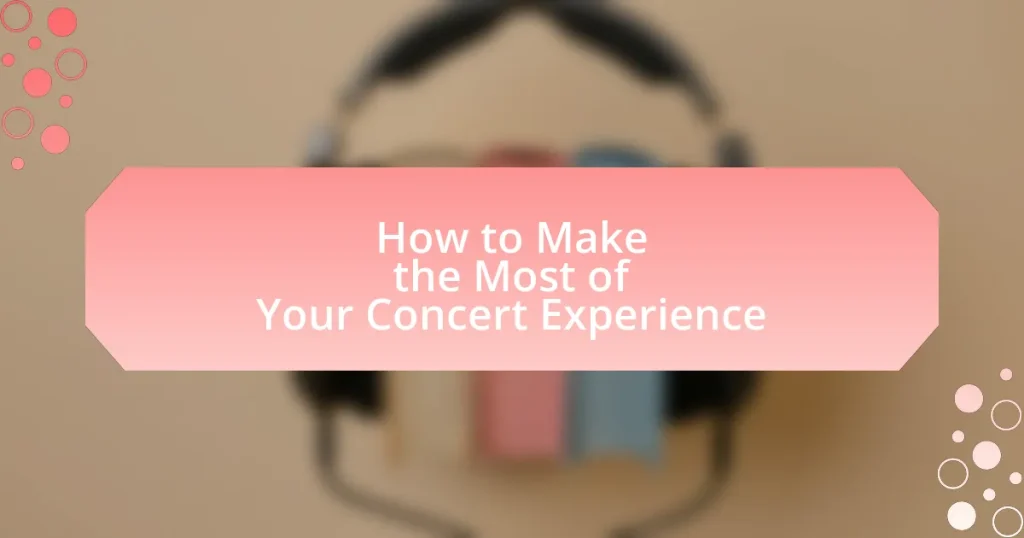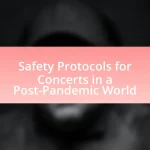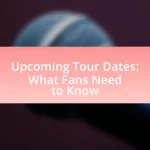The article focuses on maximizing the concert experience, detailing the unique aspects that differentiate concerts from other live events. It outlines key elements that define a concert, such as performance quality, venue atmosphere, audience engagement, and sound production. The article also explores various concert types, the influence of music genres, and practical tips for preparation, attendance, and post-event reflection. Additionally, it addresses safety considerations, strategies for enhancing enjoyment, and ways to share and remember the experience, providing a comprehensive guide for concertgoers.
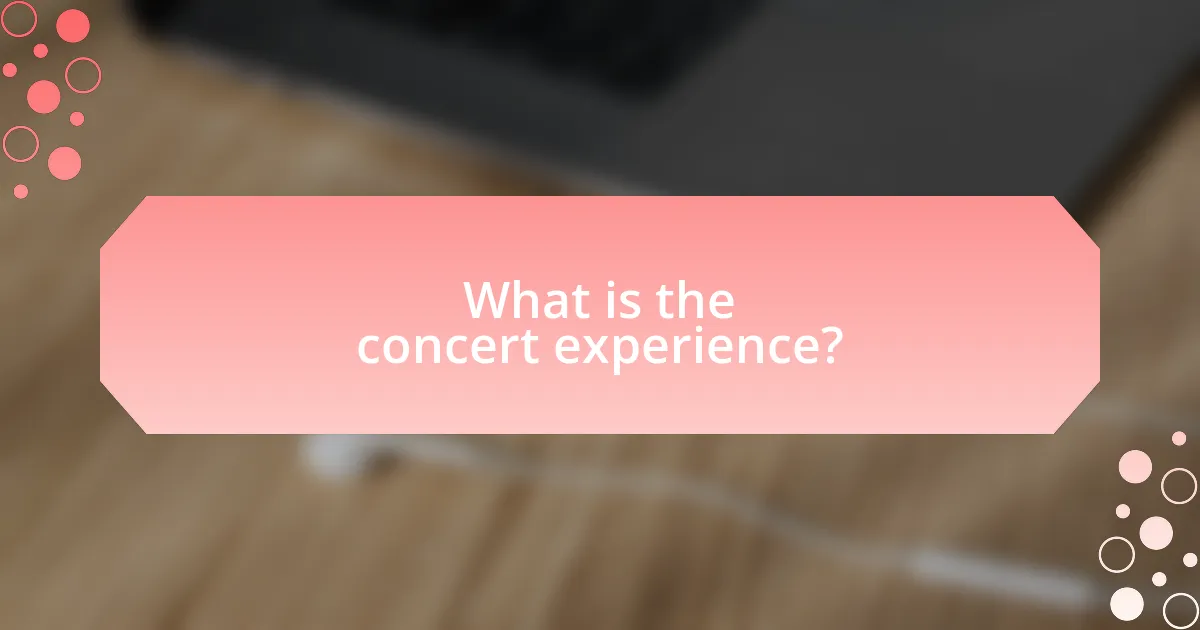
What is the concert experience?
The concert experience is a live musical performance where audiences gather to enjoy music in a shared environment. This experience typically includes elements such as the atmosphere created by the venue, the energy of the crowd, and the interaction between the performers and the audience. Concerts often feature various genres of music, and the emotional connection felt by attendees can enhance their enjoyment. Research indicates that live music events can lead to increased feelings of happiness and community among participants, as evidenced by studies showing that 95% of concertgoers report feeling a sense of belonging during performances.
How do concerts differ from other live events?
Concerts differ from other live events primarily in their focus on musical performance, where the primary attraction is the live music and the artist’s performance. Unlike theatrical plays or sports events, which may emphasize narrative or competition, concerts create an immersive experience centered around the audience’s connection to the music and the artist. This is evidenced by the unique atmosphere created through sound, lighting, and audience interaction, which is specifically designed to enhance the emotional impact of the music. Additionally, concerts often feature a setlist of songs performed live, which can vary from show to show, making each concert a distinct experience, unlike other live events that typically follow a scripted format.
What elements define a concert experience?
A concert experience is defined by several key elements: the performance quality, the venue atmosphere, audience engagement, and sound production. Performance quality encompasses the musicians’ skill and stage presence, which significantly influences audience enjoyment. The venue atmosphere includes factors such as acoustics, lighting, and overall ambiance, which contribute to the immersive experience. Audience engagement refers to the interaction between performers and attendees, enhancing the emotional connection. Sound production involves the clarity and balance of audio, which is crucial for delivering the intended musical experience. These elements collectively shape how attendees perceive and enjoy a concert, making them essential for a memorable event.
Why do people attend concerts?
People attend concerts primarily for the live music experience, which offers a unique atmosphere that cannot be replicated through recordings. Concerts provide an opportunity for fans to connect with artists and fellow attendees, creating a sense of community and shared enjoyment. According to a study by the University of Westminster, live music events can enhance emotional well-being, with 90% of participants reporting increased happiness during and after attending concerts. This emotional connection, combined with the thrill of witnessing performances in real-time, drives individuals to seek out concert experiences.
What types of concerts are available?
There are several types of concerts available, including classical, rock, pop, jazz, country, electronic, and hip-hop concerts. Each genre attracts different audiences and offers unique experiences, such as orchestral performances in classical concerts or high-energy shows in rock concerts. According to the National Endowment for the Arts, live music events, including various concert types, contribute significantly to cultural engagement and community building, highlighting their importance in the arts landscape.
How do genres influence the concert experience?
Genres significantly influence the concert experience by shaping the atmosphere, audience behavior, and performance style. For instance, rock concerts often feature high energy, loud music, and an interactive crowd, while classical concerts emphasize a more subdued environment with focused listening. Research indicates that different genres attract distinct demographics, which affects the overall vibe; for example, electronic music festivals tend to foster a sense of community and freedom, as evidenced by the popularity of events like Tomorrowland, where attendees engage in collective experiences. Additionally, the performance techniques vary by genre, with hip-hop artists often incorporating storytelling and improvisation, enhancing audience connection. Thus, the genre of music directly impacts how attendees engage with the performance and each other, creating unique concert experiences.
What are the differences between indoor and outdoor concerts?
Indoor concerts occur in enclosed venues, while outdoor concerts take place in open-air settings. Indoor concerts typically offer controlled acoustics and climate, enhancing sound quality and comfort for attendees. In contrast, outdoor concerts may face challenges such as weather variability and sound dispersion, which can affect the overall experience. Additionally, indoor venues often have limited capacity compared to outdoor spaces, which can accommodate larger crowds. The atmosphere also differs; indoor concerts provide an intimate setting, while outdoor concerts can create a more expansive and festival-like environment.
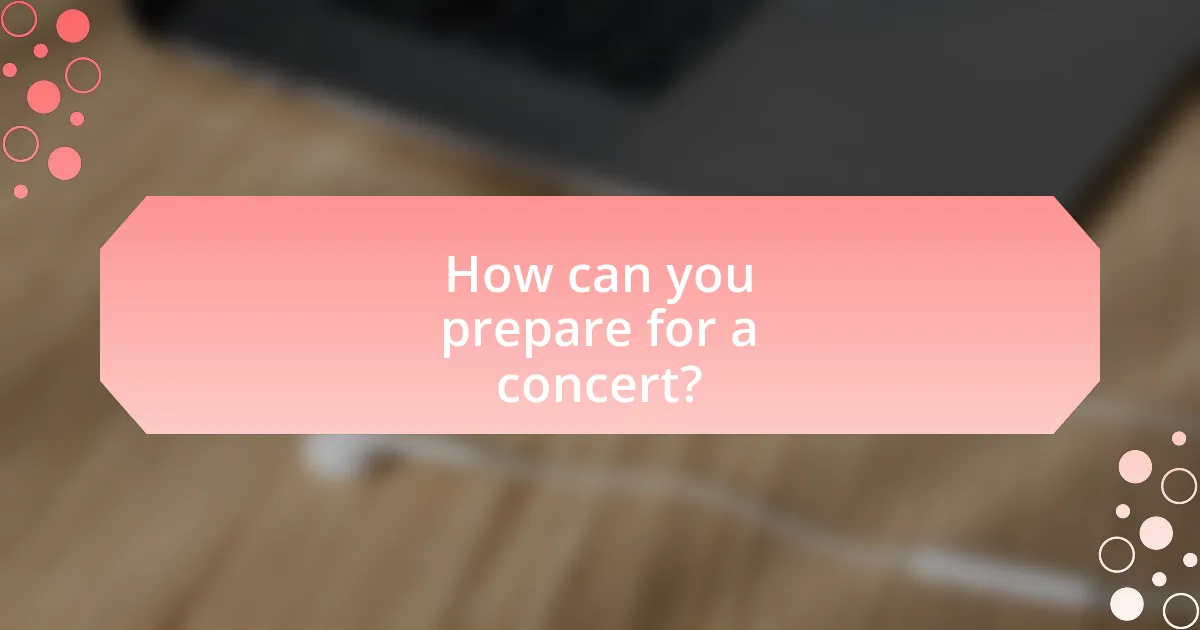
How can you prepare for a concert?
To prepare for a concert, ensure you have your tickets, plan your transportation, and arrive early. Having your tickets ready prevents last-minute issues, while planning transportation helps avoid delays. Arriving early allows you to find your seat, explore the venue, and enjoy the atmosphere. Additionally, check the concert’s schedule for opening acts and set times to maximize your experience.
What should you consider when choosing a concert to attend?
When choosing a concert to attend, consider the artist’s popularity and genre relevance to your musical preferences. Popular artists often attract larger crowds and provide a more energetic atmosphere, while niche genres may offer a more intimate experience. Additionally, evaluate the venue’s location, capacity, and acoustics, as these factors significantly impact the overall experience. For instance, larger venues may enhance sound quality but can diminish personal connection, while smaller venues often foster a closer interaction with the performer. Lastly, check the concert date and time to ensure it fits your schedule, as conflicts can lead to missed opportunities for enjoyment.
How do ticket prices vary by artist and venue?
Ticket prices vary significantly by artist and venue due to factors such as the artist’s popularity, the size and location of the venue, and the demand for the event. For instance, major artists like Taylor Swift or Beyoncé typically command higher ticket prices, often exceeding $200, while lesser-known artists may have tickets priced around $20 to $50. Venues also play a crucial role; large arenas in metropolitan areas usually have higher ticket prices compared to smaller, local venues. According to a 2022 report by Pollstar, the average ticket price for concerts in large venues was approximately $100, while smaller venues averaged around $30. This demonstrates that both artist prominence and venue characteristics directly influence ticket pricing.
What factors should you consider for concert timing?
When considering concert timing, key factors include the artist’s schedule, venue availability, audience demographics, and local traffic patterns. The artist’s schedule is crucial as it determines when they are available to perform, while venue availability ensures that the chosen date does not conflict with other events. Audience demographics influence timing, as different age groups may prefer specific times, such as evenings for adults or weekends for families. Local traffic patterns are also significant, as they can affect attendance; for example, scheduling a concert during rush hour may deter potential attendees. These factors collectively ensure optimal attendance and enhance the overall concert experience.
How can you enhance your concert experience before the event?
To enhance your concert experience before the event, plan your logistics carefully. This includes purchasing tickets in advance, researching the venue layout, and determining the best transportation options to arrive on time. Studies show that attendees who familiarize themselves with the venue and plan their arrival experience less stress and enjoy the event more. Additionally, creating a pre-concert playlist of the performing artist’s songs can heighten anticipation and enhance your connection to the music.
What are the best ways to research the artist or band?
The best ways to research an artist or band include exploring their official website, social media profiles, and music streaming platforms. Official websites often provide comprehensive information about the artist’s biography, discography, and upcoming events. Social media platforms like Instagram and Twitter offer real-time updates and insights into the artist’s personal life and current projects. Music streaming services, such as Spotify or Apple Music, allow listeners to access the artist’s complete catalog, including popular tracks and albums, as well as curated playlists that highlight their influence and collaborations. Additionally, reading reviews and articles from reputable music publications can provide context about the artist’s impact and style.
How can you plan your travel and accommodations effectively?
To plan your travel and accommodations effectively, start by researching the concert venue’s location and nearby lodging options. Utilize travel websites to compare prices and read reviews, ensuring you select accommodations that fit your budget and preferences. Booking in advance often secures better rates and availability, as evidenced by a study from the American Hotel and Lodging Educational Institute, which found that early bookings can save travelers up to 30% on hotel costs. Additionally, consider transportation options, such as public transit or rideshare services, to ensure easy access to the venue.
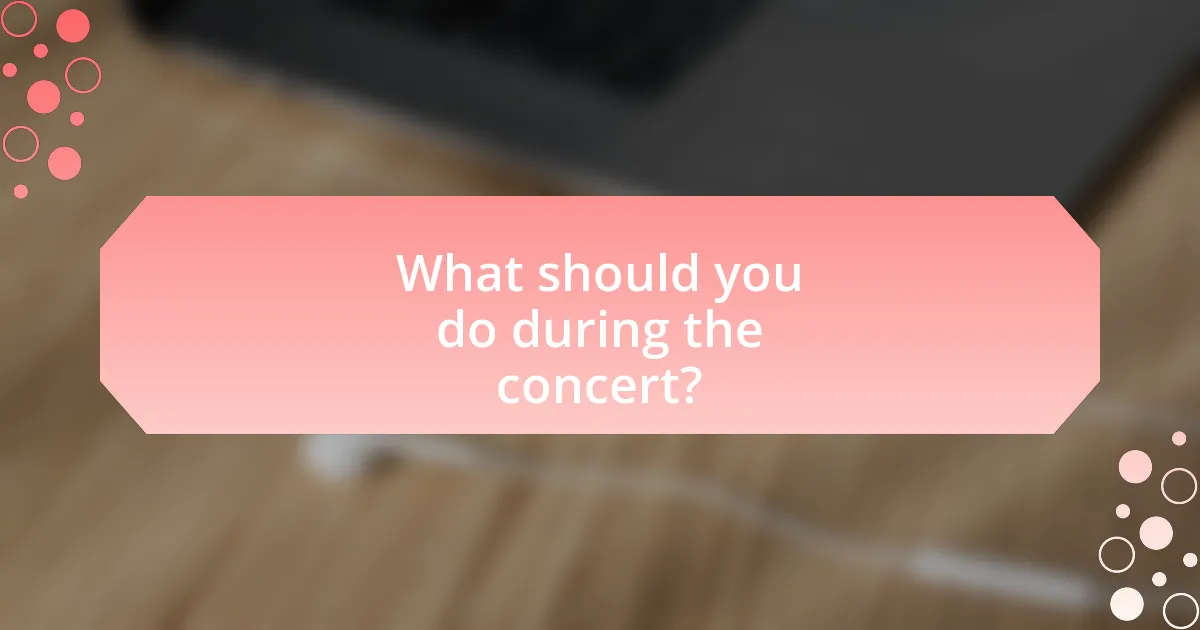
What should you do during the concert?
During the concert, you should actively engage with the performance by enjoying the music, dancing, and singing along. Engaging with the performance enhances your experience and connects you with the artist and the audience. Studies show that active participation can increase enjoyment levels, as evidenced by research from the Journal of Music Therapy, which highlights the positive effects of music engagement on emotional well-being.
How can you make the most of your time at the venue?
To make the most of your time at the venue, arrive early to secure a good spot and familiarize yourself with the layout. Arriving early allows you to avoid long lines, find your way around, and enjoy any pre-show activities or merchandise stands. According to a survey by Eventbrite, 70% of concert-goers reported that arriving early enhances their overall experience by providing opportunities for socializing and exploring the venue. Engaging with fellow attendees and participating in pre-show events can significantly enrich your concert experience.
What are the best strategies for securing a good spot?
To secure a good spot at a concert, arrive early to claim your desired location. Early arrival allows you to choose a prime viewing area before the crowd gathers. Additionally, consider purchasing VIP tickets or early entry passes, which often grant access to better positions. Research the venue layout in advance to identify optimal spots, such as near the stage or soundboard, which typically offer superior sound quality. Engaging with fellow concert-goers can also provide insights on the best areas to stand. These strategies are supported by concert-goer experiences, which consistently highlight early arrival and ticket upgrades as effective methods for securing advantageous positions.
How can you engage with the performance and the crowd?
To engage with the performance and the crowd, actively participate by clapping, singing along, and making eye contact with performers. This interaction enhances the overall atmosphere and creates a shared experience. Studies show that audience participation can increase enjoyment levels, as evidenced by research from the University of California, which found that engaged audiences report higher satisfaction during live performances.
What should you keep in mind for safety and comfort?
For safety and comfort at a concert, prioritize personal space and situational awareness. Maintaining a comfortable distance from others helps prevent overcrowding and potential hazards, while being aware of your surroundings allows for quick responses to any emergencies. Additionally, wearing appropriate clothing and footwear enhances comfort, as concerts often involve standing for extended periods. Staying hydrated and knowing the venue’s emergency exits further ensures safety and comfort throughout the event.
How can you prepare for potential crowd-related issues?
To prepare for potential crowd-related issues, individuals should familiarize themselves with the venue layout and emergency exits. Knowing the layout allows attendees to navigate quickly in case of an emergency, reducing panic and confusion. Historical data shows that in crowded events, such as concerts, having a clear understanding of exit routes can significantly decrease evacuation time, as evidenced by studies conducted on crowd dynamics during large gatherings. Additionally, staying informed about the event’s crowd management policies and following any instructions from security personnel can further enhance safety and preparedness.
What items should you bring for a comfortable experience?
For a comfortable concert experience, you should bring a portable chair or blanket, water bottle, earplugs, sunscreen, and a small bag for personal items. A portable chair or blanket provides seating comfort, especially during long events. Staying hydrated with a water bottle is essential, as concerts can be physically demanding. Earplugs protect your hearing from loud music, which can reach levels above 100 decibels. Sunscreen is crucial for outdoor concerts to prevent sunburn, and a small bag keeps your essentials organized and secure. These items collectively enhance comfort and enjoyment during the concert.
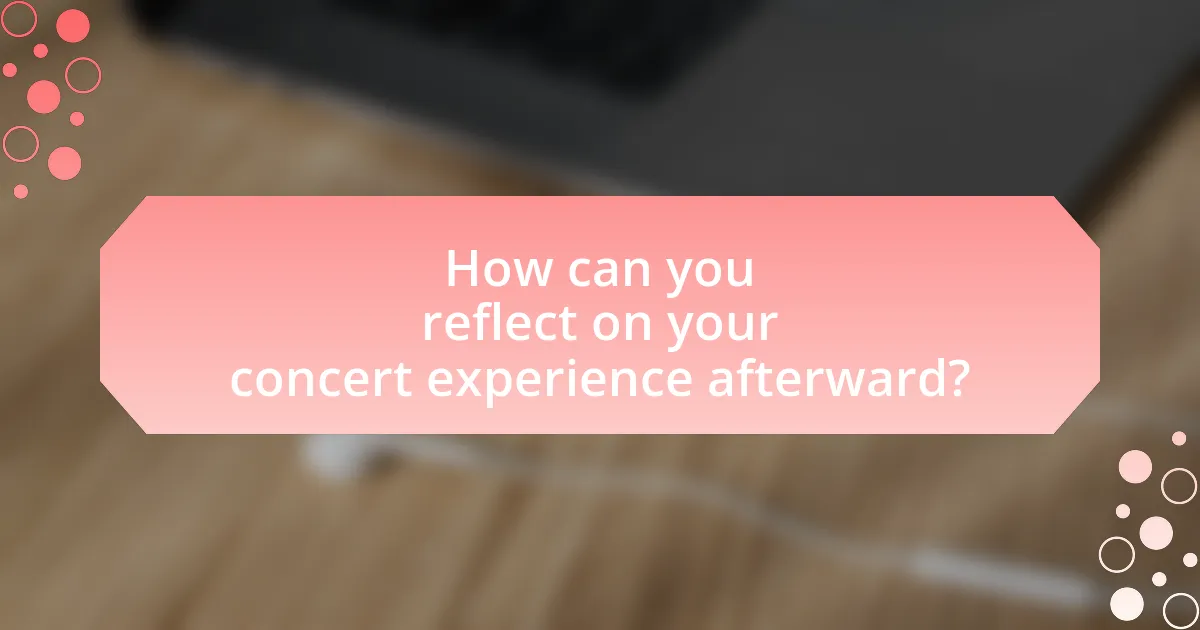
How can you reflect on your concert experience afterward?
To reflect on your concert experience afterward, analyze your emotional responses and the overall atmosphere of the event. This involves recalling specific moments that stood out, such as favorite songs, interactions with the crowd, and the energy of the performers. Research indicates that reflecting on experiences enhances memory retention and emotional processing, allowing for a deeper appreciation of the event. By journaling or discussing your thoughts with friends, you can solidify these memories and gain insights into what aspects of the concert resonated with you the most.
What are the best ways to capture memories from the concert?
The best ways to capture memories from a concert include taking high-quality photos and videos, keeping a concert journal, and collecting memorabilia such as tickets or setlists. High-quality photos and videos allow for visual recollection of the experience, while a concert journal can capture personal reflections and emotions felt during the event. Collecting memorabilia serves as tangible reminders of the concert, enhancing the overall memory. These methods are effective because they engage multiple senses and create lasting impressions of the experience.
How can you share your experience with others?
You can share your concert experience with others by utilizing social media platforms, writing blog posts, or participating in online forums. Social media allows for immediate sharing of photos, videos, and thoughts, reaching a wide audience quickly. For instance, platforms like Instagram and Twitter enable users to post real-time updates and engage with fellow concert-goers. Writing blog posts provides a more detailed narrative of your experience, allowing for in-depth storytelling and personal reflections. Additionally, joining online forums or communities dedicated to music can facilitate discussions and exchanges of experiences with like-minded individuals. These methods not only disseminate your experience but also foster connections with others who share similar interests in music and concerts.
What should you do if you have a negative experience?
If you have a negative experience at a concert, you should first assess the situation to determine the cause of the negativity. Identifying whether it stems from poor sound quality, crowd behavior, or personal issues allows for a more targeted response. For instance, if the sound quality is inadequate, you can report it to the venue staff, as they often have protocols to address such concerns. If the issue involves crowd behavior, moving to a different area or seeking assistance from security can enhance your experience. Documenting your experience through feedback forms or social media can also prompt venues to improve future events. According to a study by the University of California, addressing negative experiences promptly can significantly enhance overall satisfaction in event attendance.
What tips can help you maximize future concert experiences?
To maximize future concert experiences, plan ahead by researching the venue, setlist, and artist’s performance style. Understanding the venue layout helps in selecting optimal seating, while familiarizing yourself with the setlist can enhance anticipation and enjoyment. Additionally, arriving early allows for a better spot and the chance to soak in the atmosphere. Engaging with fellow fans can also enrich the experience, as shared excitement often amplifies enjoyment. Studies show that social interactions at events can lead to increased satisfaction, making it beneficial to connect with others.
How can you stay informed about upcoming concerts?
To stay informed about upcoming concerts, regularly check music event websites and platforms like Songkick, Bandsintown, and Ticketmaster. These platforms aggregate concert listings and provide notifications based on your favorite artists and locations. Additionally, following artists and venues on social media ensures you receive real-time updates about concert announcements and ticket sales. Research indicates that over 70% of concertgoers utilize these platforms to discover events, highlighting their effectiveness in keeping fans informed.
What are some common mistakes to avoid at concerts?
Common mistakes to avoid at concerts include arriving late, which can lead to missing key performances, and not being aware of the venue’s rules, such as prohibited items. Additionally, excessive use of phones for recording can detract from the live experience and annoy fellow attendees. Failing to stay hydrated and neglecting ear protection can also negatively impact enjoyment and health. These mistakes are often highlighted in concert etiquette guides, emphasizing the importance of preparation and respect for the performance and audience.
